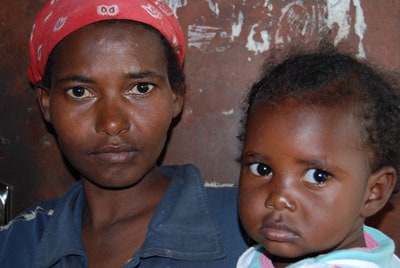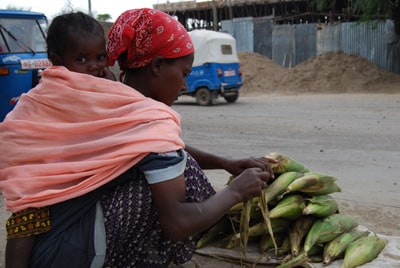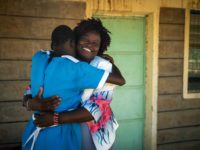Despite the Ethiopian government’s efforts to eradicate bridal abduction, it’s still frequently practiced in some rural areas. Bridal abduction has been illegal since 2005, but outside of the capital, the law is interpreted very loosely by the police and judges. Hence, girls as young as 11 years old are abducted and are given in marriage to men much older than them.
According to a study by UNICEF, marriage by abduction has many adverse effects on the girls and their communities, including perpetuating poverty, violating the human rights of the girls, causing permanent damage to their developing bodies, encouraging the transmission of HIV, and forcing girls to drop out of school.
Mulu, a 25-year-old mother of one, was abducted by her husband as she was going to visit her parents in the rural village. He had just lost his first wife and his child, and he decided to marry again.

Once Mulu was abducted, her family had no choice but to agree to the marriage, thinking that it would be a disgrace for the family if they didn’t. The majority of the girls are raped when they are abducted. Once the girl is abducted, the parents of the man send elders to the girl’s parents to ask for their daughter’s hand in marriage.
Many of the parents agree to the marriage because they fear that their daughter won’t be able find a husband after the incident is heard in the community, and that the abductor won’t return their daughter if they refuse him.
Cursing her luck, Mulu complied with the wishes of her parents to stay with her abductor and she started life as his wife. As is the custom, she asked no questions about her husband’s past life and accepted only the bits of information he provided.
“Even though it took me a long time to accept my fate, I tried to make the best out of the situation I was in. I started working as a daily laborer and took care of the house to the best of my ability. I just wanted to make my parents proud of me.”
Shortly after they started living as husband and wife, Mulu started to notice her husband’s unstable mental condition, deteriorating health and uncontrollable addiction to alcohol and chat — an herb with a narcotic effect. She became the sole provider of the household as her husband’s condition worsened.
While she was struggling to support her husband, she was also expecting her first-born. As with most of the women in her village, she was unaware of antenatal care or the importance of health checkup.s Mulu gave birth to a baby boy at home assisted by her neighbors. The baby passed away within a week.
“My whole world went dark with the death of my baby. Some said he had pneumonia and some said it was an evil spirit. I never knew the exact reason because I wasn’t able to take him to the health center.”
Soon after the death of her baby, Mulu became pregnant again. Even though the unanswered question of why she lost her first-born lingered at the back of her mind, she hoped for the best.
This time, not wanting to take a chance, she went to deliver her baby at the hospital. She was happy to return home with her baby girl.
“I counted the days, and when she became 1 week old I celebrated. Then the second week passed and I was sure everything would be OK. But the third week she started to get ill, and I lost my baby when she was 1 month old.”
Heartbroken with the loss of her children, Mulu decided to never try to have children again. She went back to her old life — working hard to support her sick husband.
“The day I knew I was pregnant again, I wanted to end my life. I didn’t want to go through another pain of burying my baby. I cursed my husband and most of all my fate.”
Even though she wanted to terminate the pregnancy, the little hope she felt inside wouldn’t let her do it.
One morning as Mulu was having coffee with her neighbors, she heard them talk about an organization that was registering babies and their mothers. What one of the ladies said caught her attention: They were registering pregnant mothers.
Mulu went to the church compound. Soon after that, she joined Compassion’s Child Survival Program. She was six months pregnant.
“I was startled to hear Mulu’s story while I was taking her history. I immediately arranged for her to go to the health center the next day and start her antenatal care. I also wanted her to get a full medical checkup because I wanted to find out why she lost her two babies.
“The next day I met her, I tried to assess what she knew about HIV/AIDS and counseled her before we went to the health center. The result was as I suspected. Mulu was found to be HIV-positive,” says Zenebech, the Child Survival Program Coordinator at the center.
For a woman who didn’t know much about the virus, the result came as a shock.
“What I heard drained the little hope I had. I couldn’t understand why my life was in such disarray.
“I hung on to every single word Zene was saying about how I can get through this. But when she told me that I can give birth to a healthy baby, I jumped up with joy. All my grief disappeared on that moment.”
Mulu was immediately started on antiretroviral therapy, and frequent antenatal care at the hospital was arranged for her. Both the physical and emotional support she received through the Child Survival Program gave her a sense of security.
Three months after she joined the program, Mulu gave birth at the hospital assisted by medical doctors who took the necessary precautions to prevent the transmission of the virus to the infant.
“I cried tears of joy when they handed me my baby girl. She tested negative for the virus, and I praised God for His gift. Had it not been for the care of the program staff, my baby would have been dead like the first two.”
The program’s intervention for Mulu didn’t stop at saving her baby’s life, but also gave her a fresh beginning filled with hope. The training she received through the program on health, hygiene and parenting has helped her change her lifestyle and care for her baby in a better way.
She was also soon given an opportunity to get involved in an income-generating activity. She was given some money, which she used to buy a bed, mattress, kitchen utensils, and to start a business.
She attended intensive training on starting a small business. She chose to sell corn and has been making a good profit. During the rainy season, she buys corn for about $3 and makes a $3 profit at the end of the day. From the $3, she saves 25 cents and uses the rest for her family.

During the dry season, she sells sweet potatoes and makes about $2.50 per day.
“More than the support I get, I value the Bible lessons and the fellowship I have at the center. My old confidence has come back and I am very content with the life I am leading now. Even though my husband still bothers me and is unhealthy, I have put my hope on the Lord, who has sustained me so far.
“The joy I feel when I see my girl is indescribable. I have stopped complaining about the turn of events in my life and have started appreciating the little blessings that come my way each day.
“The Child Survival Program has played the greatest of roles in my life. I am here today because of it and my baby is alive because of it. I have so much hope for the future and I rest assured that the program is there for me as well as my baby no matter what.”







16 Comments |Add a comment
this is such a touching story. I feel so sad for how Mulu ended up in such a marriage and for many other young girls who faced them same. It has left a heavy weight on my heart.
Very sad. There is a similar story of a Zulu bride abduction case in South Africa. The line that got me was: ““The fact that someone is interested in hearing my story makes me feel human again.”
Here’s the link:
Not sure why the link is not showng:
This is story is an amazing testimony of how the Devil is always meaning evil, But God who is rich in mercy is able to deliver and declare his glory through using his saints.
And I am so blessed to have read this testimony. I do have but 1 important question. And please feel free to comment on this anyone.
My question is… If this woman was raped before she chose to marry him. Then why not after all God has done for her does she not leave him and start a new life. Surely Christ would not be against this… Or maybe she is believing that he will to one day become a follow of Christ.
May God Richly bless you my sister.
After reading this story, my emotions are stirring. I’m angered by the fact that societies have these atrocities going on within them and most of us either don’t know any thing about them or we do and keep looking the other way. And then I feel pity for my own country, because we are so superficial. We have so much here in the United States and yet we complain about the smallest things. I pray that God will forgive us for our neglect and stir us to action: to those who have been given much, much is required. Thank you Mulu for your example of Christ, I am humbled.
This my friend, is another great story of how Compassion is breaking the cycle of poverty. Thank you so much for sharing. Two of my sponsored children are from Ethiopia and I visited one of them in 2008, so I love hearing about life there. Thanks again!
This story just reaffirms why I partner with 3 different Child Survival projects. One in Kenya, one in Haiti and one in India. It gives me encouragement to continue what I am doing and to also tell others how they can help the babies and their mothers without paying a lot of money per month. The amount I pay for the 3 projects is almost equal to what it costs for just one child sponsorship, but I feel I am able to reach more mothers like Mulu and more children like her daughter that I could otherwise. God bless Compassion and its staff and workers and sponsors and advocates as well as all the partner churches and partner countries. I am proud to be involved with such a terrific organization.
Dear Tigist Gizachew, thank you for your stories about Ethiopia. My sponsor daughter is in Debre Zeit. I am praying the government of Ethiopia will strongly enforce their laws to protect women and children. I fear for my daughter’s safety there.
I hope one day you will write a story about what Compassion is doing to fight the practice of female genital mutilation. God bless you and the work of Compassion in Ethiopia.
Kim,
You may be interested in this blog post, Child Sponsorship is Not in Vain. It was written by a formerly sponsored child who grew up in a culture where “Female genital mutilation (FGM) and forced marriages of 13-year-old girls to men decades older than them characterize the lives of 99 percent of Maasai girls.”
Thank you, Chris, for that information. Could it become possible for me to sponsor my child’s salary through her project? I received a letter from Nigatu Yohannes of Kuriftu Kale Heywot Church through Compassion and he says the people there have many needs. It would be nice for ET106 to be a pilot program for reciprocal letter writing. My sponsor daughter is 20 years old, has good handwriting and could help the little ones compose responses. I could donate to their church and they could use the money to pay her salary and address some of their other needs as well. God bless you all!
Kim,
Last I heard, Ethiopia was expected to implement reciprocal letter writing this past summer. I’m checking to see if that was done. I’ll also refer you to our blog post on reciprocal letter writing – particularly the comments section – because they talk about what it means for a country to be a reciprocal letter writing country.
As for your question about funding your child’s salary, it’s a fantastic idea but not something we can support. Your idea would require special handling on our part to ensure the integrity of the arrangement and that could have potential ripple effects for us from the standpoint of time and monetary efficiencies.
However, you can definitely make a gift to the child development center and our staff would work with the church staff to use the money in a way that best benefits the children the church serves. You can give between $100 and $2,000 a year. And like with child and family gifts, you can suggest how you’d like the money used so the staff are aware, but we cannot make any guarantees that the money will be used for the purpose requested.
Thanks, Chris! I will need to keep praying for guidance.
Wow what a heart wrenching story. Praise God and praise God for Compassion
Dear Mulu, thank you so much for sharing your story with us. I am so happy to see a picture of the beautiful girl that God has given you- what is her name? You have had some great difficulties and sadnesses in your life, and some struggles still continue for you. I think you are a courageous woman and I respect you. I am so happy that you heard about the Child Survival Program and that it has been so helpful to you. When I read your story I am overjoyed to be able to support CSP. I think perhaps that many more people will become CSP supporters when they hear your story. Imagine how many other parents and babies might be greatly helped by this. Praise the Lord.